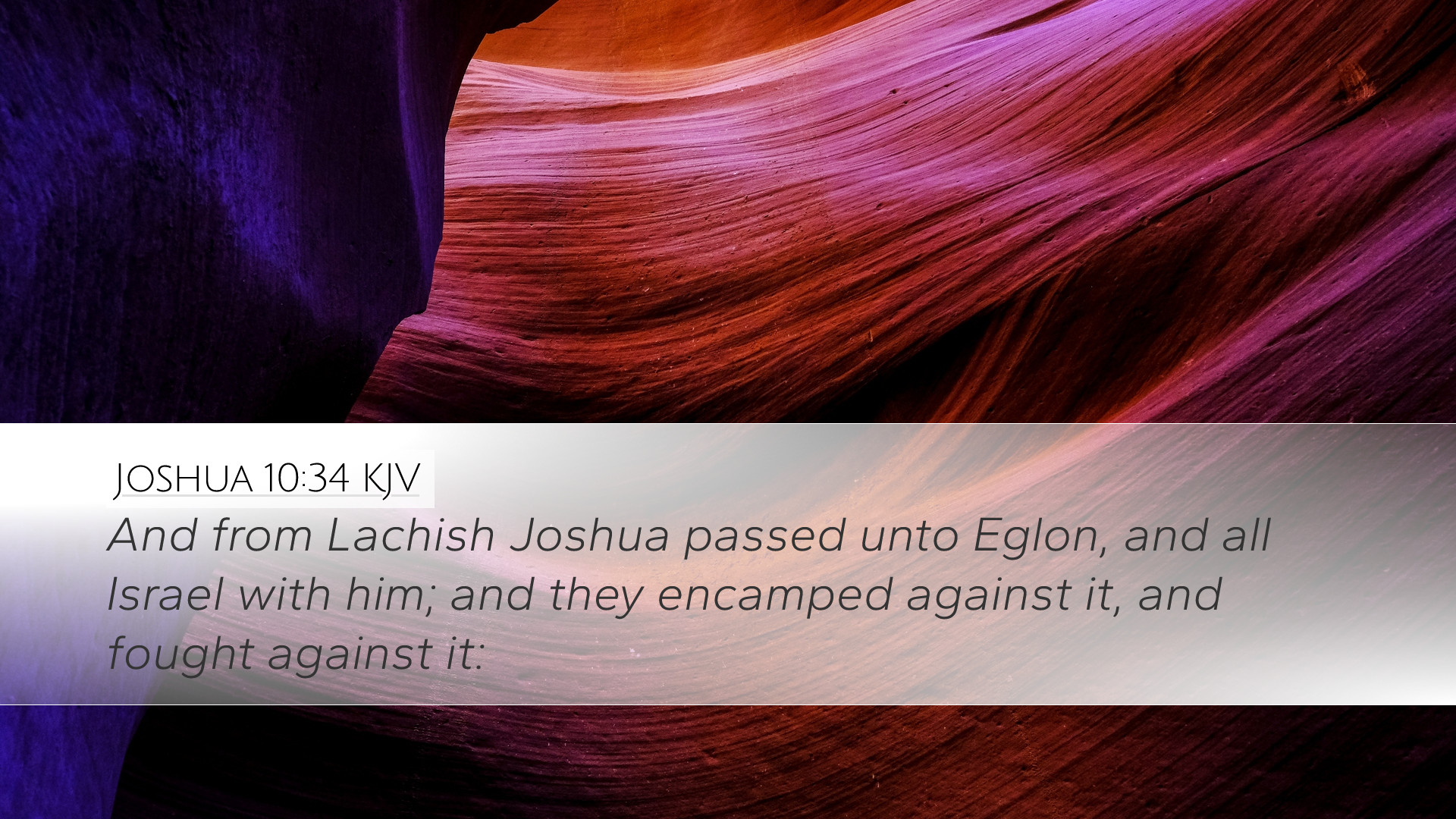Bible Commentary on Joshua 10:34
Text of Joshua 10:34 (NIV): "Then Joshua and all Israel with him moved on from Libnah to Lachish; he took up positions against it and attacked it."
Introduction
The verse in Joshua 10:34 encapsulates a critical moment in the Israelite conquest of Canaan. It marks the continuation of God’s directive to Joshua to lead Israel into battle against the cities of the promised land. The interplay of divine guidance and human action in this narrative provides rich material for commentary, where various theologians have shared their insights.
Contextual Analysis
This passage takes place in the context of a series of battles as Joshua leads the Israelites to claim the land promised to Abraham, Isaac, and Jacob. This section of the book chronicles the military campaigns against key cities in Canaan that God had instructed them to conquer.
- Historical Background: Lachish was a significant city-state in the region, strategically located and fortified. Its capture would not only affirm Israel’s dominance but also serve as a morale booster for the nation.
- Theological Significance: The verse highlights God's faithfulness in fulfilling His promises as Israel undertakes the conquest—theological historians emphasize the sovereignty of God over military endeavors.
Commentary Insights
Matthew Henry's Commentary
Henry interprets Joshua's actions as an illustration of both physical and spiritual warfare. He posits that just as Joshua attacked Lachish with preparation and strategic positioning, Christians must prepare for spiritual battles:
- Preparation: "Indeed, a well-prepared army is key to victory, and spiritual readiness is equally vital for believers in the face of challenges."
- Divine Support: "The history of their conquests serves as a reminder that divine support is paramount; 'Unless the Lord builds the house, the laborers labor in vain.'"
Albert Barnes' Commentary
Barnes elaborates on the implications of God's promise to Israel in terms of their military engagements, pointing out that each victory is both a literal conquest of land and a symbolic defeat of opposing forces:
- Symbolism of Lachish: "Lachish represents the strongholds of sin and opposition to God, which must be conquered in the believer’s life."
- God’s Assurance: "The assurance of victory rooted in God’s promises encourages believers to engage in their own spiritual plots with faith rather than fear."
Adam Clarke's Commentary
Clarke focuses on the narrative structure of this conquest account. He notes the importance of obedience to God’s command and highlights Joshua's leadership:
- Leadership in Battle: "Joshua's role as a leader is underscored; he exemplifies obedience and decisiveness, qualities vital for effective spiritual leadership."
- God's Sovereignty: "It is clear in this context that victory is ultimately in the hands of God, as Joshua acts on divine instructions rather than personal will."
Theological Themes
Several prominent themes are interwoven into this passage that can serve as focal points for further exploration:
- Faith and Obedience: The call to act in faith based on God's assurances precedes each battle Israel engages in, demonstrating the relationship between trust and action.
- Divine Sovereignty vs. Human Agency: Joshua’s leadership and strategy showcase human effort within the framework of God's overarching plan.
- Spiritual Warfare: The physical battles against fortified cities serve as metaphors for the inner struggles Christians face against sin and spiritual adversities.
Application for Today
The rich insights from these commentaries provide contemporary readers, including pastors and theologians, with applicable lessons:
- Preparation for Challenges: Just as Joshua prepared for battle, believers are called to equip themselves spiritually through prayer and Scripture.
- Faith in Action: The assurance of God’s presence and guidance should embolden Christians to confront the challenges they face with courage and resolve.
- Community and Leadership: Joshua’s leadership underscores the importance of community in undertaking God’s work effectively and faithfully.
Conclusion
Joshua 10:34 serves as a vital reminder of the interplay between divine promise and human obedience. The commentaries from Henry, Barnes, and Clarke provide a robust framework that illuminates not just a historical event but the ongoing journey of faith that continues to resonate with believers today. Pastors, students, and scholars alike can find in this verse a profound encouragement to trust in God’s plan and undertake the spiritual battles that lie ahead with the assurance of divine triumph.


